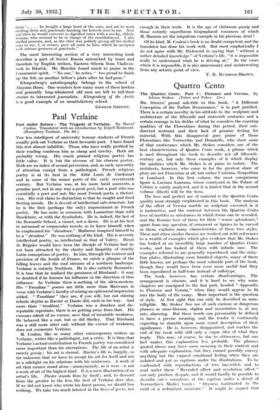Paul Verlaine
Poet under Saturn : The Tragedy of Verlaine. By Marcel Coulon. Translated with an introduction by Edgell Rickword. (Humphrey Tonimin. 10s. 6d.) THE less intelligent of university honour students of French usually pick out Verlaine as their favourite poet. I have found this test almost infallible. Those who have really profited by their reading condemn him as cheap and tawdry. Both are probably wrong. His much praised religious poetry has little value. It is but the obverse of his obscene poetry. Both are an index of sexual perversion, and, as such, unworthy of attention except from a pathologist. French religious poetry is at its best in the Abbe Louis de Cardonnel and in some of the minor poets of the early seventeenth century. But Verlaine was, at his more lucid moments, a genuine poet, not in any way a great poet, but a poet who was essentially a poet and not, like most French poets, a rhetori- cian. His real claim to distinction is that he caught and fixed fleeting moods. He is devoid of intellectual sub-structure, but he is the first (perhaps the only) impressionist in French poetry. He has more in common with Lamartine than with Baudelaire, or with the Symbolists. He is, indeed, the last of the Romantic School, a sunset, not a dawn. He is at his best in autumnal or crepuscular moods, as he knew himself, when he emphasized his "decadence." Mallarme imagined himself to be a " decadent." He was nothing of the kind. His is severely intellectual poetry, as intellectual as that of Valery. Henri de Regnier would have been the disciple of Verlaine had he not been attracted by the clarity and limpidity of strictly Latin conceptions of poetry. In him, through the contour and precision of the South of France, we catch a glimpse of the falling leaves and the cool streams of a northern landscape. Verlaine is entirely Northern. He is also entirely Romantic. It is true that he realized the greatness of Rimbaud : it may be doubted if he foresaw his influence or the direction of that influence. In Verlaine there is nothing of the ultra-modern. His " Freudian " poems are little more than Marivaux in verse with Verlaine's faculty of seizing an ephemeral impression added. " Troublant " they are, if you will, but not stirring infinite depths as Racine or Dante did, each in his way. And more than " troublant." Verlaine was a drunken and dis- reputable reprobate, there is no getting away from that. His excesses admit of no excuse, save that of incurable weakness. He behaved like a cad, but so did Shelley. That Rimbaud was a still more utter cad, without the excuse of weakness, does not exonerate Verlaine.
M. Coulon, like so many other contemporary writers on Verlaine, writes like a pathologist, not a critic. It is time that Verlaine's actual contribution to French poetry was considered more important than his aberrations. The life of an artist is merely gossip : his art is eternal. Racine's life is, happily, so far unknown that we have to accept his art for itself and not as a sidelight on his relations with his mistresses. A work of art that cannot stand alone—anonymously, as it were—is not a work of art of the highest kind. It is a mere illustration of an artist's life. Phedre stands thus by itself ; and, to descend from the greater to the less, the best of Verlaine does also. If we did not know who wrote his finest poems, we should lose nothing. We take too much interest in the lives of poets, not enough in their wOrk. It is' the age of clubroom gossip and those entirely superfluous biographical romances of which M. Maurois set the iniquitous example in his precious Ariel I Of its kind, M. Coulon's book is no doubt competent and the translator has done his work well. But most emphatically I do not agree with Mr. Rickword in saying that " without a rather detailed knowledge" of Verlaine's life, "it is impossible really to understand what he is driving at." In the cases where it is impossible, it is also unnecessary and uninteresting from any artistic point of view.
T. B. RUDMOSE-BROWN.






























 Previous page
Previous page